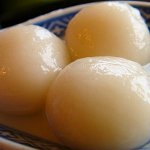Dongzhi Festival Date in the current year: December 21, 2026
 In China and other parts of East Asia, winter solstice is marked with a traditional festival called the Dongzhi Festival. Falling between December 21 and December 23, it is celebrated by the Chinese, Japanese and Koreans, but only Macau recognizes Dongzhi as a public holiday.
In China and other parts of East Asia, winter solstice is marked with a traditional festival called the Dongzhi Festival. Falling between December 21 and December 23, it is celebrated by the Chinese, Japanese and Koreans, but only Macau recognizes Dongzhi as a public holiday.The Dongzhi Festival is celebrated on the shortest day of the year. Its origins can be traced back to the ancient yin and yang philosophy of the cosmic balance and harmony between two opposites. In Chinese philosophy, yin and yang are two opposite forces: shade and sun, dark and light, cold and warm, north and south, passive and active, female and male.
While the two forces may seem contrary, they are in fact complementary, interconnected, and interdependent. There’s no yin without yang and no yang without yin. Their dynamics is seen in all formsof change and difference, from the annual cycle to gender roles. People are not supposed to resist this duality or choose one of the forces; what really matters is the harmony between yin and yang.
During the cold season, the dark yin energy prevails. Things begin to change during the Dongzhi solar term that marks the winter solstice. As days grow longer, the positive yang energy begins to flow in, and each day brings people closer to balance and harmony. The Dongzhi Festival marks this important milestone in the annual cycle.
Originally an end-of-harvest festival, the present-day Dongzhi is a time for family reunions and get-togethers. One of the festival’s traditions is the cooking and eating of tangyan, small balls made of glutinous rice. They are considered to be a symbol of family unity because their name is a homophone for the Chinese word for “union”.
Tangyan are typically served as a dessert. They can be boiled or deep fried, white or brightly colored, plain or stuffed with sesame, sweet bean paste, tangerine peel, chopped peanuts, etc. Unfilled tangyan are usually served as part of tong sui, a sweet dessert soup. Each family member gets at least one large tangyan and several smaller ones.
In northern China, people also eat savory dumplings on Dongzhi. This tradition is believed to have originated from Zhang Zhongjing, a physician, writer and inventor of the Han dynasty. According to legend, on a cold winter day, he encountered a poor man suffering from chilblains on his ears. Feeling sympathetic, Zhang Zhongjing ordered his apprentices to make ear-shaped dumplings filled with lamb, and distribute them among the poor to keep them warm and prevent their ears from getting chilblains.
Old traditions require people from the same clan or sharing the same last name to worship their deceased ancestors on this day. Although not all Chinese follow this tradition anymore, Taiwanese people offer special nine-layer cakes made from rice flour as a ceremonial sacrifice to honor their ancestors. These cakes are shaped like animals that symbolize auspiciousness in Chinese tradition, such as chickens, ducks, pigs, cows, sheep, and tortoises. Another interesting custom in Taiwan is to eat hearty tonic foods, such as mutton hot pot and ginger duck hot pot.
- Category
- Cultural Observances, Folk Festivals
- Country
- Hong Kong, Taiwan, China, Macau
- Tags
- Dongzhi Festival, folk festival, cultural observance, Chinese festival, public holidays in Macau